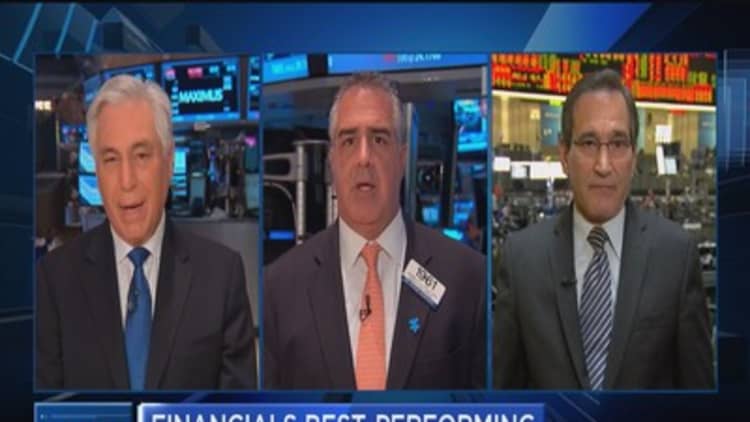



U.S. stocks closed lower on Friday, as continued uncertainty over Greece pressured stocks and investors kept an eye on a calmer bond market ahead of next week's Federal Reserve meeting. (Tweet This)
The major averages ended the week flat. The S&P 500 ended the week up 0.06 percent for the longest streak of sub-1 percent weekly moves since 1993, according to Bespoke Investment Group. The Dow eked out gains of 0.28 percent, while the Nasdaq Composite closed 0.34 percent lower for the week.
Stocks trimmed losses in morning trade amid a Reuters report that the Greek government is ready to submit counter-proposals and that Athens and its creditors are closer than ever to a deal, a Greek official said. Prime Minister Alexis Tsipras also spoke on the telephone with European Commission President Jean-Claude Juncker about the next steps in negotiations.
The official added Greece expects a deal by June 18 when the euro group of regional finance ministers meets, Reuters said.
The Dow Jones industrial average came off lows to end about 140 points lower after falling as much as 182 points with all blue chips in the red. All sectors in the S&P 500 declined as the major indices lost more than half a percent.
"The key component is, with what's happening in Europe, we should probably be nervous how this Greece situation turns out," said Art Hogan, chief market strategist at Wunderlich Securities.
Declines in oil weighed on energy, which declined 1 percent to vie with health care as the worst performer in the S&P 500. Energy was the worst performer for the week, while financials was the best.
Twitter closed mildly higher, losing earlier gains of about 3 percent. The stock is in focus after spiking 9 percent in after-hours trade following the late Thursday afternoon announcement that CEO Dick Costolo would step down next month. The news comes after investor calls for a leadership shakeup following a sluggish run for Twitter stock as the tech company struggles to grow revenue and expand its user base.
Incoming CEO Jack Dorsey said on CNBC's "Squawk On The Street" that he will maintain Twitter's strategy regardless of criticism.
The standoff between Greece and its creditors worsened on Thursday after the International Monetary Fund walked out on talks with Athens, citing "major differences" over how to save the country from bankruptcy. The news pressured stocks, with European and U.S. equities closing with mild gains.
Peter Cardillo, chief market economist at Rockwell Global Capital, said he doesn't "see much panic in the market" and the IMF's announcement was "probably more of a pressure tactic."
"With the markets focusing on Greece and a little bit of uptik in yields, this morning, we're probably looking at a market that's going to be trading sideways," he said, noting some nervousness ahead of next week, with the Federal Open Market Committee releasing its highly-anticipated June statement and quarterly options expiration on Friday.
Investors will scrutinize the statement for clues on the timing of a short-term interest rate hike. Consensus is for the U.S. central bank to begin tightening in September.
European stocks closed lower on Friday, with the German DAX 1.2 percent lower after falling more than 2 percent. The ATHEX Composite ended nearly 6 percent lower.
Senior European Union officials have formally discussed for the first time a possible Greek debt default as negotiations between Athens and its creditors have stalled ahead of an end-month repayment deadline, several officials told Reuters.
Still, analysts remain confident Greece will remain in the euro zone.
"We would expect there would be some type of resolution that will allow Greece not to default ... likely to be a more short-term solution, buying time," said Eric Wiegand, senior portfolio manager with U.S. Bank's private client reserve. "We do think investors should be aware things are likely to increase—more volatility not only around headlines surrounding Greece but economic data. We get a central bank meeting next week."
Read MoreRisk looms for bond fund investors
In economic reports out Friday, the Producer Price Index increased 0.5 percent for May, topping expectations for 0.4 percent. The gain was the largest since May 2012. The core PPI figure of ex-food, energy and trade services fell 0.1 percent for the month.
The preliminary Michigan consumer sentiment posted 94.6 for June, an increase from May's final read of 90.7.
"The focus for the U.S. equity market is the turnaround in the U.S. economy on the positive side and the Greek drama on the negative side," said Krishna Memani, chief investment officer at Oppenheimer Funds. "The sentiment for the U.S. market is extremely negative. If we get any rate stability and economic improvement (the trend will be) higher rather than lower."
Bond markets were calmer on Friday. The U.S. 10-year Treasury yield traded near 2.39 percent on Friday, near Thursday's closing level. The benchmark yield hit 2.5 percent level for the first time since Oct. 1 on Thursday, following the 10-year German bund yield's largest one-day drop in two years.
Read MoreEarly movers: TWTR, BOJA, URBN, WSM, GOOG & more
The U.S. dollar traded flat against major world currencies with the euro creeping towards $1.13 on encouraging headlines out of Greece. Earlier, the euro dipped to near $1.12 after comments from German Chancellor Angela Markel that a "too strong" euro made reforms for countries such as Spain and Portugal difficult.
Major averages this week
The Dow Jones Industrial Average closed down 140.53 points, or 0.78 percent, at 17,898.84, with Merck leading all blue chips lower.
The closed down 14.75 points, or 0.70 percent, at 2,094.11, with energy leading all 10 sectors lower.
The Nasdaq closed down 31 points, or 0.62 percent, at 5,051.10.
The CBOE Volatility Index (VIX), widely considered the best gauge of fear in the market, traded near 13.5.
The Dow transports closed 0.4 percent lower, for its fourth negative week out of the last five.
About two stocks declined for every advancer on the New York Stock Exchange, with an exchange volume of 475 million and a composite volume of 2.3 billion in afternoon trade.
High-frequency trading accounted for 49 percent of June-to-date's daily trading volume of about 6.1 billion shares, according to TABB Group. During the peak levels of high-frequency trading in 2009, about 61 percent of 9.8 billion of average daily shares traded were executed by high-frequency traders.
Crude oil futures for July delivery settled down 81 cents, or 1.33 percent, at $59.96 a barrel on the New York Mercantile Exchange. Gold futures settled down $1.20 at $1,179.20 an ounce.
Correction: This story has been updated to show that the core PPI figure of ex-food, energy and trade services fell 0.1 percent in May.


